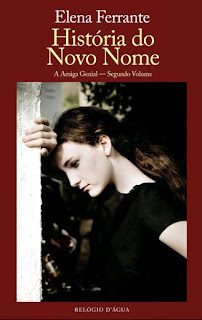quinta-feira, março 24, 2016
História do Novo Nome, de Elena Ferrante
This is the second part of the story of two Neapolitan friends by Elena Ferrante. At first, I wasn't enjoying it very much, the first chapters seemed inferior to the first book, somewhat repetitive, but then the story caught strength and it became just as good. The characters are credible and real, the author really knows how to convey the different stages and feelings involved in a deep friendship, and the depiction of the narrator's struggle to come out of her poor and hopeless background is excellent. It's also a very good fresco of the life at the times the novel is set. So, looking forward for the third volume.
segunda-feira, março 21, 2016
O Retorno, de Dulce Maria Cardoso
A very good book, about something that has been very seldom written about, the return of half a million people from the Portuguese colonies in 1975. I remember very well the returnees, for whom I felt at the time sympathy and solidarity, also because, having just returned myself from 2 years in Cape Vert, I was a little acquainted with the kind of life they had left behind, and because they seemed to me different from the boring familiar people of the metropolis, with different experiences and freer mores. I had several good friends among them at the time; later I understood they were not exotic or special, just people who got caught in the consequences of a misguided policy and who tried to cope how they could, and that the apparent "specialness" was mostly bragging to feel like they were compensating for what they had lost. And that's why I liked this book so much, I think it expresses extremely well the situation, how they were and what they went through, not using the pretence to glamour like so many of them did, and in that way being so much more true to how it really was. It is also an excellent depiction of the atmosphere of the times - the revolutionary period, with its absurdities that seem so strange now. All in all, a very strong narrative, and I hope more people would write about this period that is being forgotten without ever having been duly analysed.
quarta-feira, março 09, 2016
Margarita e o Mestre, de Mikhail Bulgákov
I had heard about this book for a long time, but didn't have any idea of how it was. I was very surprised - after a few pages, when someone's head is chopped off by a tram car, it's just like embarking on a rollercoaster of a surrealistic absurd. The writing is light, funny and witty, and it reminded me of other fantastic novels, like Manuscript found at Zaragoza. There is a background of social critic of the Soviet society and the absurd of burocracy, but always subtle and intelligent. A nice surpise.


